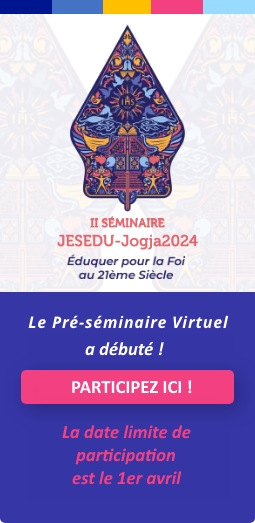Jesuit Education Australia (JEA) held two Learning by Refraction training workshops in March of 2023–one hosted by St. Ignatius’ College in Adelaide from 15 March to 18, and the second one by Xavier College Kew from 22 March to 25.
The two Trainers’ Training Labs were facilitated by Fr. Johnny C. Go SJ and Rita Atienza, co-authors of the book Learning by Refraction: A Practitioner’s Guide to 21st Century Ignatian Pedagogy.
The workshops gathered a total of 35 educators: 13 in Adelaide and 22 in Melbourne.

Eight Australian schools were represented in the two workshops: St. Aloysius ‘ College (Sydney); St. Ignatius’ College Riverview (Sydney); St. Ignatius’ College (Adelaide); St. Ignatius’ College (Geelong); Xavier Catholic College (Ballina); Loyola College, Watsonia (Melbourne); Redfern Jarjum College (Sydney), and Xavier College (Melbourne).

Jesuit Social Service also sent representatives particularly for their work in Ignatius Loyola Centre and the Jesuit Community College.

The Trainers’ Training Labs built on past JEA efforts to strengthen the practice of Ignatian Pedagogy in the Jesuit and Companion schools in Australia. Fr. Johnny had conducted an introductory workshop in Canisius Center in Pymble way back in February of 2020. Also, during the pandemic, a number of schools took Fr. Go’s online MasterClass, which he described as a deep dive into 21st-century Ignatian pedagogy.

As Elizabeth Phipps of St. Aloysius’ wrote of the Learning by Refraction approach:
The refraction metaphor in Learning by Refraction helps us to conceptualise that learning involves something more than reflection. A student doesn’t simply “reflect back” the ideas exactly as they are taught; they must bend, wrestle with and change those ideas in order to make meaning. When learning is truly meaningful it needs to lead to action in the real world.

The Trainers’ Training Lab was designed as a four-day hands-on training to strengthen competence on this particular approach to the IPP.
But it was also designed to build the participants’ confidence in training staff. As Stephen Uren of SIC, Adelaide, noted, “The hands-on approach and consistent reference to subject based issues allows participants to see the real-world application of these teaching and learning concepts.”

Russell Newman of St Ignatius’ Riverview put it: “Through our ‘learning by doing’ workshop, we gained immensely from the activities presented by colleagues from other schools and ministries engaged in this work of reimagining the Ignatian Pedagogical Paradigm.”

Probably the richest component of the Trainers’ Training Lab was the feedback on the module design presented by each working group. The feedback offered after every presentation was so thoughtful, specific, and constructive that everyone learned so much more in the process.

By the end of the workshops, a range of modules had been generated that, with some adaptation, would be easily transferable to any school setting.
A lot of professional conversations were also conducted in the course of the workshops. Andrew Taylor of Saint Ignatius’ Riverview, who described the Trainers’ Lab as a powerful experience, recounted: “Collectively, we wrestled with big ideas, zoomed in on the micro of Teaching & Learning and always had the students we teach in the front of our minds.”
For Andrew Dobson of Saint Ignatius’ Adelaide, the experience also generated even more questions about the IPP such as “how can LBR enhance students’ ability to develop human excellence?” These questions are expected to lead to more fruitful and rich discussions.
More than just technical training, however, the workshop was also a rare opportunity for these dedicated Ignatian educators to take a step back to explore possible strategic interventions and approaches, discussing so-called “adaptive” challenges and learning from one another’s experiences in order to better meet the needs of their staff and to motivate them to expand their teaching repertoire to incorporate LBR in their practice.
Matthew Lee of Loyola Watsonia wrote: “Taking the next step in looking at how to strategically implement this at the school along with building a collective community over the four days was really productive and something that can only be a positive moving forward.”
Philippa McIllroy of Jesuit Social Services expressed her gratitude for the chance to join the workshop and learn from her colleagues: “I am excited about embedding [LbR] in our work, allowing it to help us continue to embed our current practice in our values, vision, Jesuit heritage and Ignatian identity.”

Likewise, Peter Watters of St Ignatius’ Riverview welcomed the opportunity to learn from his colleagues about LbR and future possibilities of how it can help them design education more intentionally.
Jennie Hickey of JEA led discussions at the close of the two gatherings to explore the best ways to continue to support and accompany this group of trainers as they work together to further JEA’s efforts to strengthen the practice of IPP using the 21st century approach of Learning by Refraction in their schools.

In the very last session in Melbourne, Rita expressed her awe at the outputs of the workshop as well as her optimism about the practice of IPP in the Jesuit and Companion schools in Australia.
Of the two Trainers’ Training Labs, Fr. Johnny had this to say: “With such high-calibre and passionate Ignatian educators gathered together, one can’t go wrong simply because of their shared wisdom and collective energy. The whole experience has truly been an embarrassment of riches in terms of insights and inspiration!”
Thanks to Jennie Hickey (JEA) for organizing the training labs, as well as to Fr Peter Hosking SJ, Barbara Watkins and Kain Noack (SIC, Adelaide), and Fr Chris Middleton SJ, Bill Doherty, and Monique Dalli (Xavier, Melbourne) for hosting the participants so warmly.

Note: Fr Johnny and Rita’s book, Learning by Refraction: A Practitioner’s Guide to 21st-Century Ignatian Pedagogy, has been translated into several languages and has been used as basis for training educators not only in Australia and the Philippines, but also in Asia Pacific and Europe. The book is published by the Ateneo de Manila University Press.
This article was originally published in https://www.jcapedu.org/
Se connecter ou Adhérer
pour créer et afficher des commentaires
